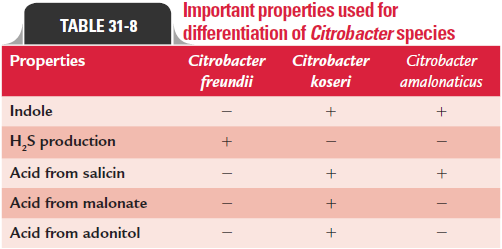Chapter: Microbiology and Immunology: Bacteriology: Nonsporing Anaerobes
Citrobacter - Nonsporing Anaerobes
Citrobacter
Citrobacter is a normal inhabitant of the intestine of humans.The genus Citrobacter consists of three species, namely,Citrobacter freundii, Citrobacter amalonaticus, and Citrobacter koseri (formerly C. diversus). They grow well on nutrient agarand other ordinary media producing smooth and convex col-onies. The colonies are not pigmented. On MacConkey and DCA media, they produce pale colonies. Citrobacter spp. are motile, H2S positive, MR positive, citrate positive, and indole variable. They do not decarboxylate lysine, but most strains decarboxylate ornithine. They ferment lactose late or do not ferment at all. Differences between three species in their biochemical characteristics are summarized in Table 31-8. They show extensive antigenic sharing with salmonellae, hence may be mistaken for salmonellae. Certain strains pos-sess a Vi antigen, closely related to the antigen of Salmonella Typhi and SalmonellaParatyphi. Citrobacter spp. may cause infections of the urinary tract, gall bladder, and middle ear and meninges. C. koseri may occasionally cause meningitis in neonates.

Related Topics